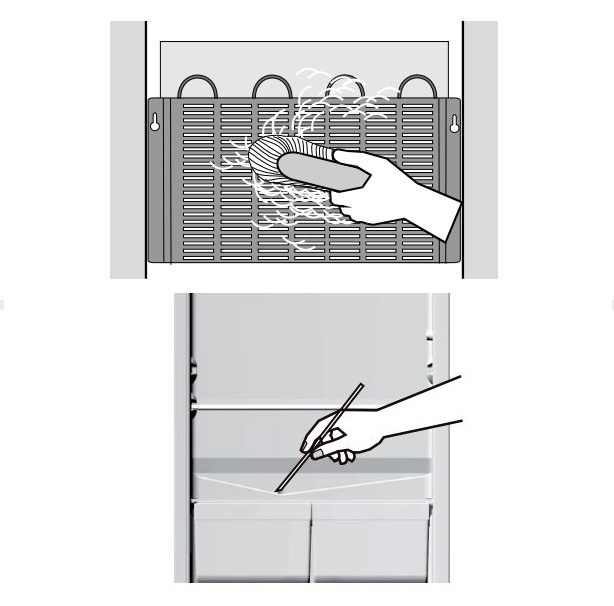
Asko Refrigerator Error Codes
| Fault | Cause or Remedy |
|---|---|
| The appliance does not operate after connection to the mains | Check if there is power in the socket and if the appliance is switched on. |
| Cooling system operates continuously without intermittent stoppages: | Ambient temperature too high. |
| Frequent opening of the door, door open too long. | |
| Door not closed properly (particle between door gasket, sagged door) | |
| Excessive quantity of fresh food inserted at once. | |
| Refrigerator probe is clogged with fresh food. Relocate the food to provide air circulation around the probe (certain models only). | |
| Check air circulation for suffi cient cooling of the compressor, and clean the condenser. | |
| Excessive ice formation at the rear interior wall of the freezer | Frequent opening of the door, door open too long. |
| Inserting hot food in the freezer. | |
| Food or dish is touching the rear interior panel of the refrigerator. | |
| Bad door sealing; clean or replace the gasket if dirty or damaged. | |
| Build-up of ice or frost in the freezer interior may be a result of the following: | Door opened too frequently or too long. |
| Door not properly closed. | |
| Poor door sealing. | |
| If the seal is dirty or damaged, clean or replace it. | |
| Water dripping from the appliance: | Drain outlet is clogged, drain water drips past the collection groove. |
| Clean the clogged outlet using plastic straw. | |
| Thaw thick ice deposits manually. | |
| Flashing signal light H: (only freezer) | Frequent opening of the door, door open too long. |
| Door not closed properly. | |
| Excessively long power failure. | |
| Excessive quantity of fresh food inserted at once. | |
| Diffi cult door opening: | If you attempt to open the immediately closed door of the freezer you may experience resistance. |
| LED lighting does not work: | If the LED lighting no longer works, call an authorized ASKO service technician. |
| Signal light B is fl ashing: | If the signal light B is fl ashing, call a service technician. |
| Error code displayed: | If the character E appears on the digital display (certain models only), call service assistance. |
Noise Level
The refrigerator – freezer appliances are cooled by the refrigeration system with a compressor (assisted by fan in certain models) whose operation may produce certain noise. The level of such noise depends upon the location, correct use and age of the appliance.
- After starting the appliance, the operation of the compressor (the refrigerant fl ow) may be somewhat louder. This does not mean that something is wrong with the appliance, neither has it any infl uence on the lifetime of the appliance. Gradually the noise is reduced and eventually subsides.
- Sometimes the appliance produces unusual and stronger noise which is rather unusual for the appliance. This noise is often the consequence of inadequate positioning of the appliance:
The appliance should be placed and leveled fi rmly on solid base.
It should not touch the wall or adjacent kitchen units standing next to it.
Check whether the accessories in the interior of the appliance are placed correctly in their positions; also check the bottles, tins and other vessels that might touch each other and rattle.
Asko Refrigerator – Cleaning The Appliance

Prior any cleaning attempt disconnect the appliance from the mains (see the control chapter for ON/OFF function), and pull the power cord from the mains wall outlet.
Make sure to remove traces of any cleansing agents you had been using.
- Clean the exterior of the appliance with water and liquid detergent.
- Do not use abrasive or aggressive agents (such as stainless steel cleansers) for cleaning of plastic and coated surfaces as you can damage them.
- Clean coated and/or aluminum surfaces with soft cloth and alcohol based cleansing agent (for example glass cleaners).
- Wash the interior of the appliance with liquid detergent and lukewarm water, mixed with a little vinegar.
- Containers, shelves, and drawers with a decorative profi le (metallic appearance) are not dishwasher safe! They can only be cleaned with a dissolved liquid detergent and a soft cloth. Do not rub them!
- Groove and drain outlet located underneath the cooling panel at the rear wall collect the drained water, so they must not be clogged (with food particles, for example). Make sure you inspect them periodically and clean if necessary (use plastic straw to free the outlet hole).
- The condenser unit mounted on the (exterior) back wall should always be kept clean, free of dust or similar deposits. Occasionally clean the dust using a soft non-metal brush or a vacuum cleaner.
- Clean also the drip pan above the compressor. If you removed the pan, please make sure you replace it to the same position, and check that it is in completely horizontal position!
- Clean also the drip pan above the compressor. If you removed the pan, please make sure you replace it to the same position, and check that it is in completely horizontal position!
Defrosting the No Frost freezer
- Defrosting the No Frost freezer
- Build-up of ice or frost in the freezer compartment can be a result of abnormal use of appliance (door opened too frequently and/or too long, door not properly closed etc.). In this case, unplug the appliance, remove the food from the freezer and protect them from defrosting. Clean and dry the freezer interior. Before returning the frozen food into the freezer, switch on the appliance and select the desired setting.
Appliance with Electronic Control
